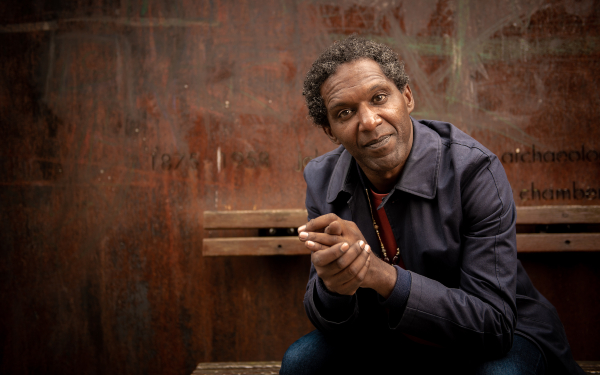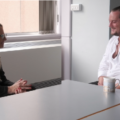
To what extent does the stigma surrounding care-experienced people originate within the care system itself?
- To a large extent (56%, 297 Votes)
- Somewhat (28%, 147 Votes)
- Not very much (11%, 58 Votes)
- Not at all (5%, 28 Votes)
Total Voters: 530
Moments into our conversation, Lemn Sissay kindly grounds me with a sobering truth.
Before our meeting, I’d spent most of the previous year conducting interviews that reflected on social work over the past five decades – including the progress the profession had made – for Community Care’s 50th anniversary.
But when I ask Sissay – renowned poet, author, broadcaster and former child in care- what progress he has seen, he politely shuts the question down.
“There is no child in care right now who’ll ever find themselves feeling better by thinking whether it’s better now than it was 10-15 years ago,” he says instead.
Should ‘success stories’ be highlighted?
A prominent activist for improving the care system, Sissay has spent decades delivering talks, writing books and plays, and making documentaries about the challenges of the care experience. And he seldom fails to command attention with his work.
His 2012 TED Talk, A child of the state, at the Houses of Parliament, has garnered over a million views, his autobiography was a number one Sunday Times bestseller, and his 2018 documentary, Superkids, where he helped seven children in care put their experiences into words, was nominated for a BAFTA award.
“I’m reporting back to you to say quite simply that you can define how strong a democracy is by how its government treats the child of the state,” he said, when concluding his 2012 talk.
All this may explain why he’s averse to sector organisations highlighting positive experiences of care. Doing that would be missing the point, he tells me.
“The [core] of the care system is that it gives care. So, why would I spend all my time talking about the success stories, when that is why the care system exists?
“A child is in distress in a familial situation and finds themselves in care to be cared for. All of them should be success stories. All I am saying is that if one person is being ill-served then that person is the one we need to pay attention to,” he says.
He pauses, laughs, then attempts to clarify further.
“If somebody falls out of a window and breaks their leg on the pavement, I don’t say, ‘Look, there are lots of people who haven’t broken their legs.’”
The scars of a childhood in care
His voice drips with ardency whenever he speaks about children in care, which, as you can imagine, is often.
You can spot it in every interview, talk or documentary. He approaches the topic with generosity, passion and openness despite the indelible mark of pain behind each experience he shares.
Because, for Sissay, this has always been personal. He is well aware of what it means to be failed by the care system.
At two months old, he was plucked away from his Ethiopian mother, renamed Norman and placed with a long-term foster family.
At the age of 12, the family rejected him and he was sent back to social services. He spent the next six years in various children’s homes, the only black boy in most cases.
In his long career, Sissay has frequently detailed the abuse he faced in the children’s homes – whether emotional, physical or racial. He was attacked with profanities and racial slurs, kicked at and spat at. Within 12 months, he became suicidal.
“The most common thing that I learned from 18 years in the care system was that everyone will leave you when you love them – which would play out more in my adult life,” he says.
‘I was in an emotionally desolate place’
Sissay’s emotional state at the time he left care was mirrored in the flat he was placed in. It was empty – no furniture, no bed. No monetary help had been allowed him either – a specific request by the then head of social services at Wigan, he tells me.
“It was so desolate,” he says now. “I think it as a metaphor [because] I too was in an emotionally desolate place in the aftershock of an explosion that happened around me and inside me throughout my time in care.”
He’d go on to spend his career trying to articulate that feeling, and the lifelong consequences of an adolescence devoid of care, through his work.
“I can’t have what I wasn’t given. And all I’ve ever tried to do is articulate what it’s like not to have it. Because then, that might show people how big what was taken away from me is, how all-consuming. I search for metaphors like “an emotional Hiroshima” that can give somebody an idea as to what the experience of nothingness might be.”
Seeking accountability from the care system
Through his work, it seems to me, he has continuously asked for accountability – from the system that was supposed to be his guardian and the government that failed to recognise the importance of supporting children’s social care.
In 2015, when he received his files after years of inquiring, he sought financial accountability from the state.
“Upon seeing my files, I saw in writing that a lot of the decisions that impacted me as a child were financial,” he says. “It wasn’t social workers who were mediating, it was insurance companies.
“So I wanted the government to be answerable on its own merits. That’s how you dealt with me during my childhood, so that’s how I should ask for you to be answerable.”
Six months later, he received an offer of £2,000, 11 times less than the amount he had requested.
“They said to me, ‘We have to treat you like we’d treat everybody else, so we’ve got £2,000.’ And I thought, ‘No, you have to treat me like me. You have to treat every child in care like an individual.’”
And so began a three-year legal battle that was finally settled out of court in 2018. Sissay used the money to buy a house – something concrete and permanent to mark years of instability.
‘People need to see the care system for what it is’
Throughout the years of telling his story, Sissay has also sought accountability from the public.
In 2017, he put on a one-night-only show at the Royal Court in London, where he had Julie Hesmondhalgh, formerly of Coronation Street, read out to him the psychologist’s report from his case against Wigan council.
It would be the first time the audience and Sissay would hear of its contents.
“I wanted to show them that what happened in my childhood has affected me in my adult life. It affects lots of people in care – they end up in prisons, mental institutions, or committing suicide,” he says.
“I wanted to show the depth of that – I think that’s been part of my purpose, whatever that means.”
He maintains that his work has always been primarily aimed at the general public. Politicians, he argues, are driven by the need to secure votes, often through leveraging the public’s prejudices but also by prioritising the matters it deems most pressing. Currently, the care system is low on that list.
“[People] need to see the care system for what is and what it isn’t. And I think it’s the most important government department. I don’t know why we don’t see this other than [because of] society’s prejudice against children in care and social workers.”
He attributes this to what he calls ‘familial hypocrisy’ – families’ conviction that they don’t need to concern themselves with the care system unless they come to need it.
“The stigma is based on the simple fact that a child in care is living, walking proof that things can fall apart, and all families are about proving the opposite. A child in care is therefore seen as a physical, walking threat to an idea families are trying to uphold,” he says.
“This is why social workers are incredible; they see the truth, that families are a mess but also beautiful. And, actually, social workers do more work to keep families together and not apart.”
Celebrate those who’ve inspired you

Photo by Daniel Laflor/peopleimages.com/ AdobeStock
Do you have a colleague, mentor, or social work figure you can’t help but gush about?
Our My Brilliant Colleague series invites you to celebrate anyone within social work who has inspired you – whether current or former colleagues, managers, students, lecturers, mentors or prominent past or present sector figures whom you have admired from afar.
Nominate your colleague or social work inspiration by filling in our nominations form with a few paragraphs (100-250 words) explaining how and why the person has inspired you.
*Please note that, despite the need to provide your name and role, you or the nominee can be anonymous in the published entry*
If you have any questions, email our community journalist, Anastasia Koutsounia, at anastasia.koutsounia@markallengroup.com
‘Social workers need to feel valued by society’
Addressing that stigma and establishing the care system as an urgent public concern are how it will find a place in politicians’ priority list, he continues.
“I see too much evidence of children who are in care who have suffered at the hands of inadequate foster parents or the budgetary constraints of our local councils. Children being moved around for no other reason than [financial ones],” he says.
“It’s got nothing to do with their wellbeing. And I’m also sorry that social workers have to watch this happening. It’s on their watch and they need our support.”
As a spokesperson for children’s social care, he has experienced, seen, read and heard about the issues plaguing the social work workforce.
He was a big supporter of Josh MacAlister’s 2021-22 Independent Review of Children’s Social Care, which stated that its recommendations depended “upon well-supported, confident and trusted practitioners who have the knowledge and skills to meet the needs of children and families”.
Sissay adds: “Social workers need and deserve to be the highest paid civil servants in local government. They’re dealing with the most important asset of our society – children in care.
“They should have the highest regard [and so] there needs to be a massive year-long PR campaign about social workers. When they come to work, they need to feel that they are valued by society.”
The stigma within the system
However, he warns, social care also needs to take a deep look inward, because some of its cracks are self-inflicted. Prejudice plays its ugly part here too.
When I ask him about the stigma of being a child in care, Sissay admits that the idea of “something being wrong with a child in care or them being overdemanding” is born within the system that cares for them.
“It’s very easy to have a blanket opinion of a person who’s obviously traumatised but quite demanding. All children are challenging – it’s the nature of childhood. But a child in care, by nature of them being in care, has to be challenging.”
And so he leaves me with one final reminder – something always insinuated but never clearly stated when discussing children’s social care.
“The word ‘love’ should be right at the heart of the care system. And love is an action – an active verb.”







 Bournemouth, Christchurch and Poole
Bournemouth, Christchurch and Poole  Hampshire County Council
Hampshire County Council  Oxfordshire County Council
Oxfordshire County Council  South Gloucestershire Council
South Gloucestershire Council  Wokingham Borough Council
Wokingham Borough Council  Webinar: building a practice framework with the influence of practitioner voice
Webinar: building a practice framework with the influence of practitioner voice  ‘They don’t have to retell their story’: building long-lasting relationships with children and young people
‘They don’t have to retell their story’: building long-lasting relationships with children and young people  Podcast: returning to social work after becoming a first-time parent
Podcast: returning to social work after becoming a first-time parent  How managers are inspiring social workers to progress in their careers
How managers are inspiring social workers to progress in their careers  Workforce Insights – showcasing a selection of the sector’s top recruiters
Workforce Insights – showcasing a selection of the sector’s top recruiters 

 Facebook
Facebook X
X LinkedIn
LinkedIn Instagram
Instagram
The story of your lived experience of a child in the care system is insightful, we forget how traumatising it must feel for a child/ young person.
As professionals is it wrong to fight for better support guidance,funding to support those we claim to be the voice of.
Our early experiences not only from the difficuiltys a child may have experienced to warrent accommodstion but how we has professionals behave can impacts how the child/young person views their place in the system/society.
Your resilience and understanding to challenge your situation can only help a system acknowledge it needs to change.
Thanks. I agree with you. But I do sound a bit ranty in this piece. I forgot to say that I am founding member of The Gold From The Stone Foundation who support Christmas Dinners for care leavers on Christmas Day. It started in Manchester in 2013. In 2023 there were over thirty dinners across the country. They are provided by members of the community who start a steering group in September/October to organise it. It is a joy.
My biggest question is : does social work care about families bonding together? The fact remains that nobody can care for a child more than the birth mother. In the event that a child is taken away from the birth parents for whatever reason, what effort does social workers put in to remedy or alleviate the shortcomings (if ever) of the parents to be sure they are fit to now look after a child ?
The focus should always be to come up with ways and programmes whereby children and parents can be together again in the shortest possible time. This will greatly help the society and more stable (emotionally, psychologically) children who will in turn be better off.
The councils spend a whole lot of money for children in care. Half of that should be used to help ensure parents raise their children themselves. The remaining half will be used to provide amenities for the general public.
I have always and will always love the way you shine a spotlight on children in care – your voice is powerful because you’re speaking from the heart and your lived experience. Our children need your advocacy, ranty or not (and for the record i don’t think you come across that way at all) because while some things have changed for the better much has not – and someone with a platform just needs to keep telling it as it is and holding feet to the fire – that’s you! Thank you!
Adults who abuse children in the here and now do not see them as adults one day.
I believe that our role as a parent,carer, Aunt,Uncle whosoever one might be that the duty is to create memories of a child or young adult.Unfortunately,some of us create the wrong memories ,leaving persons bitter not better in the future.
However,we are created with the ability to.procreate and create out own Family by whatsoever means.
Thank you for this piece that gave me some insight and reflections. Language in social work recording about children really matters, helpful to highlight the trauma and how that manifests in children rather than seeing the children as challenging. Putting love into social work is critical to our work, but why do we not move towards it?
Thank you for your talk. When I have mentioned that I have been in care, I have invariably had the same response, ‘you have done so well considering’ No I have done so well, graduated, successful career, because I was determined to prove my parents wrong, that i am not ‘stupid’, ‘some kind of moron’ due to my dyslexia and no good.
I have never wanted pity, just the recognition of being a worthwhile person.
Hey Lemn, thanks so much for this. I do not find it in the least bit ranty. If it is a rant it is a lyrical and beautiful one. As a social worker I really appreciate your support and generosity towards our profession and your tireless advocacy for children and young people in the care system. I agree with you that the treatment of the child of the state just like the treatment of the person seeking asylum should be a measure of the success of our government. We are failing miserably from where I stand. I agree with what you say about many social work decisions being based on finances. We need to take back our residential care homes and foster carers into public ownership and kick out those making extortionate profits out of children and young people in care. They should not be a commodity. I also strongly agree that social workers should be paid more and are incredibly under-valued in society. Despite all the austerity, chaos and decay in the system I am proud every day to do the job I do. Thank you Lemn.
Hello Lemm I was put into an orphanage at the age of nine months in Shropshire. There followed a lifelong horrible time, physically, sexually, and emotonally abused. I was placed in an old farmhouse with no elecxtricity or water and bullied from the age of five in 1955. It leaves you so crippled emotionally and unable to be demonstrative and unable to form healthy relationships.
However, I came through to an extent and was a shorthand teacher for thirty years. All our records in Shropshire were destroyed. I had a half sister who was fostered only a short way from me, but I didn’t know of her existence. I could write all day but I would like you to know I am coming to see you in Newark in February. I wrote to your agent twice to ask if I could meet you for a couple of minutes but they never replied. I wanted you to sign my copies of your books andjust look you in the face!
I think the way you have highlighted the shocking care system is amazing. Before you I don’t think many people were aware of what went on.
Hi Lemn
As an ex foster parent, social worker and now agency decision maker for a fostering provider, reading your article really moved and inspired me.
Daily I read reports with the purpose of evidencing standards of care. I am part of an ‘industry’ that measures quality by meeting ‘National minimum standards.’ The fact that a regulatory framework measures outcomes for our most vulnerable children, by the bear minimum has always irked me, to say the least. I am proud of the fact that many children do thrive in foster care. There are many fantastic foster parents who are strong advocates and embrace and nurture. However, too many also let children down and as you say, find the challenges that often truamatised children face, too difficult.
I am going to keep you in my thoughts and embed your insight into my practice. Thankyou !